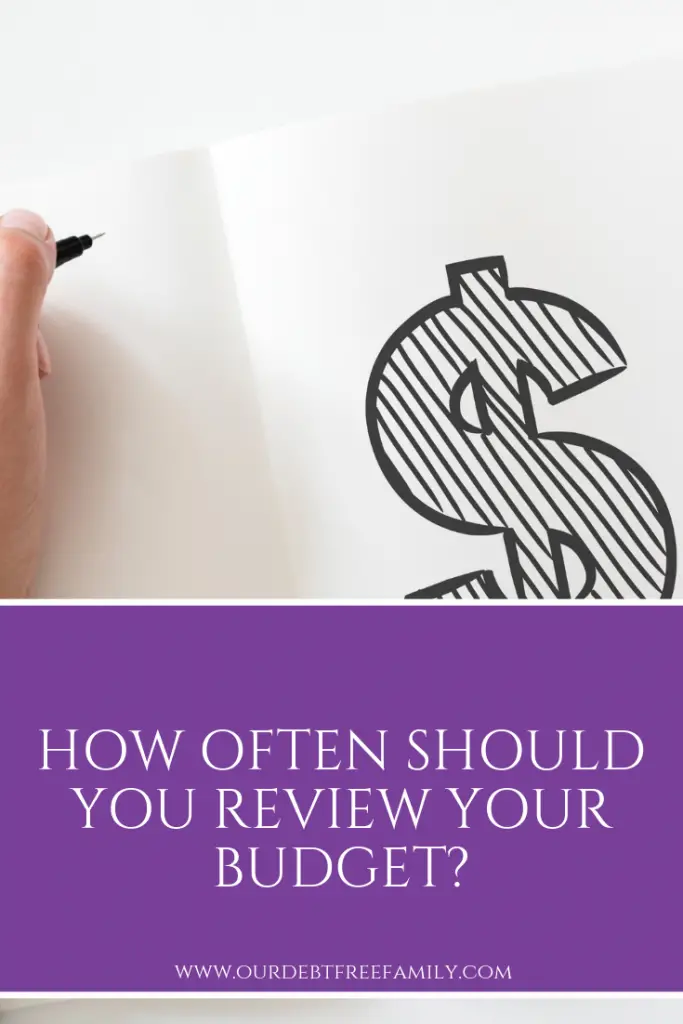Budgeting can be a huge pain, especially if it seems like you are constantly revisiting it. I feel like we are constantly examining our budget for places to trim and save more money. Even if you’re not in the midst of a financial crisis, you should review your budget on a regular basis to make sure you’re accounting for changes and saving as much as possible. So, how often should you review your budget?

1. When There’s a Major Shift in the Overall Economy
Before we get into the periodicity of budget review, the most important time to review your budget is when there are uncontrollable economic changes that will affect your spending power. We are in unprecedented financial times where inflation can eat away at your income without notice. If you’re waiting for your periodic budget review to catch the impact of economic changes, you may be heading for increased debt.
2. When There’s a Change in Your Finances
You should absolutely take a look at your budget whenever there is a major change in your personal financial situation. So, you’ll want to review your budget when you’ve gotten a raise, lost income, or paid off debt. If there’s a major change in cash flow, you’ll likely need to make major changes to your budget which may be for the better. For individuals with a bit more disposable income, you’ll want to increase your savings and retirement investments. Consider opening a Webull account where you can invest for free. They even offer an IRA options and a wide variety of research tools to for beginners to reduce risk.
If you have lost income due to a pay cut, working less hours, or encountered a period of unemployment, you’ll want to trim unnecessary costs immediately in order to save money. Having liquid savings is crucial in debt reduction as it prevents us from falling into the hands of predatory lenders. First comes debt, and then goes your credit. The latter leads to even more debt.
3. Monthly
We are currently looking at our budget on a monthly basis because we need to identify places to trim constantly. Many others take a look at their budget on a monthly basis as well, especially if they are attempting to pay off debt. The best time to do this is generally at the end of the month. Take a look at the previous month’s budget and determine how well it worked for you and your family. Adjust certain aspects of your budget as needed. Here are 3 printable debt free charts to help track your budget.
4. Quarterly
Another great way to review your budget is quarterly. Many of us make financial goals at the beginning of the year. Revisiting those goals, and your budget, every three months can help you stay on track. It can also help you review where you may be able to trim costs on a larger scale. For instance, if you notice you’re spending a lot on entertainment the first quarter of the year, you can make a concentrated effort to scale back in the second quarter.
5. Biannually or Midyear
You should always take a look at your budget at the 6-month mark of the year. Did you make financial promises to yourself as a New Year’s resolution? Budgeting and better financial management are on the country’s the top 10 list of New Year’s resolutions. You’re at the halfway mark and this is the time to see how well you’ve been budgeting for the first half of the year. Another benefit to a midyear budget review is acknowledging the incoming heavy spending periods; summer vacation, back-to-school, Thanksgiving, and Christmas. If you have never conducted a personal midyear budget review, here is a great article on how to conduct a midyear budget review.
5. Annually
Some people thrive on an annual budget and only review it throughout the year if there is a major change in their finances. For me, this simply wouldn’t work, but if you are already debt-free and have a great savings plan in place, an annual budget review may work for you. Consider investing in dividend paying stocks. However, keep in my that even the most profitable companies in the world conduct at least quarterly budget reviews. A lot can happen in the span of 12 months. You may be missing out on opportunities if you fail to identify budget challenges or additional savings and investment potential early on.
6. Conclusion
If you’ve ever asked yourself how often should you review your budget, you’re not alone. It is a question I’ve struggled with occasionally. Keeping constant tabs on your finances can be exhausting but the financial freedom it can lead to is motivating! Budgeting is never a once size fits all situation so I suggest you try starting with a monthly budget review then decrease the frequency depending on your budget spending and income variations.
Readers, how often do you review your budget?
Read More
- Cash App Glitch 2023: Is the Free Money Glitch Real?
- Throwing an Epic Kids Birthday Bash on a Shoestring Budget? Try These Creative Cost-Saving Tips
- Why You Need A Personal Mid-Year Budget Review and 5 Things to Do Now
- Get Organized and Start Planning With This Free Budget Planner
- 5 Simple and Free Budgeting Tools You Could Be Using
- How to Create a Budget That You Will Actually Use